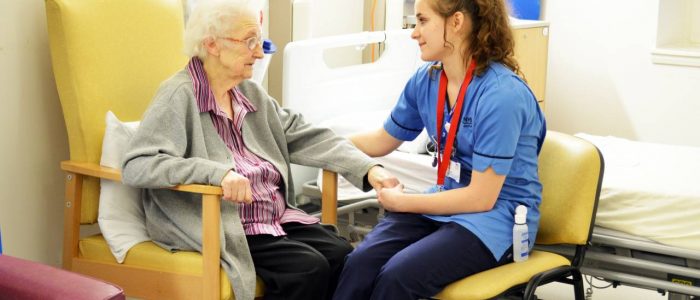New Checks Benefit Forth Valley Patients
Patients are benefiting from “pro-active” nursing in wards across Forth Valley.
NHS Forth Valley – backed by the University of Stirling – have been rolling out “care and comfort rounds” , which involves checking and helping patients more regularly, rather than waiting on buzzer calls.
A report on the initiative – published in the journal “Nursing Management” – says:
- patient falls have been reduced, as has been a reliance on buzzers;
- patient experiences and patient satisfaction levels have improved; and
- staff satisfaction in “care delivery” has also increased.
An evaluation of the new system also showed that people felt that wards were quieter and that communication with family and carers had improved.
The “Nursing Management” report, published in February this year, came 12 months after the Francis report into the care failings at Mid Staffordshire NHS Foundation Trust.
Dr Kathleen Stoddart, the clinical doctorate programme director at the University of Stirling’s School of Nursing, Midwifery and Health, said: “Francis describes failure of organisational systems and processes, as well as humanity.
“To dress the imbalance created by this focus on failing, nurses are turning to quality improvement initiatives to enhance and demonstrate the quality of care they deliver to patients as teams. Conducting systematic ’rounds’ for patients is one way of trying to ensure the highest standards of care.”
These “care and comfort” rounds are now common across acute and community hospitals in Forth Valley. The University and its students worked with NHS to analyse the implementation of the new rounds, looking particularly at the use of call buzzers – which fell – and the numbers of slips, trips and falls.
Under the new system, staff are encouraged to check patients every two hours – although patients can “buzz” for help at any time. Patients are regularly ask asked if they have any pain, need to go to toilet, or need a drink, or need to change their position. Nurses have also been given advice on how to speak to relatives.
Dr Stoddart said: “Care and comfort rounds have proved to be successful and have become a central means to assure quality of care. Anticipation of patient needs and concerns is a strategy for success.”
Professor Angela Wallace, NHS Forth Valley Nurse Director, said: “Patient safety and experience is our number one priority. Care and comfort rounds not only create a safer hospital environment but also provide reassurance to the patient.
“Sometimes people do require help but hesitate to call a nurse because they don’t want to bother staff. However these checks, which are carried out proactively at regular intervals, make sure that all needs are being addressed. It makes all the difference to patients to see a friendly caring face and to be able to spend time talking to a nurse at the bedside and tell them what really matters to them.”


